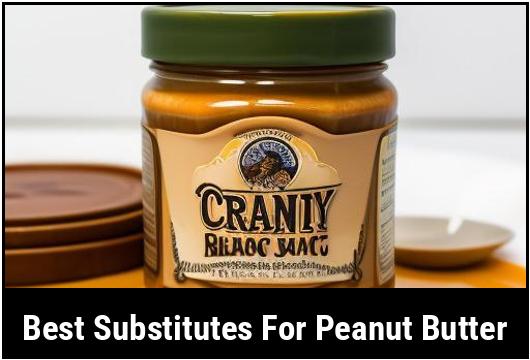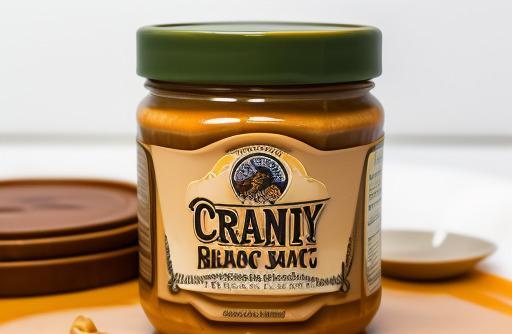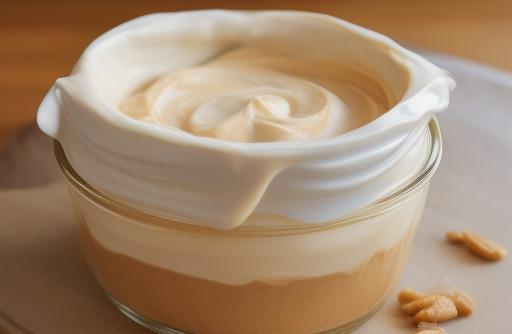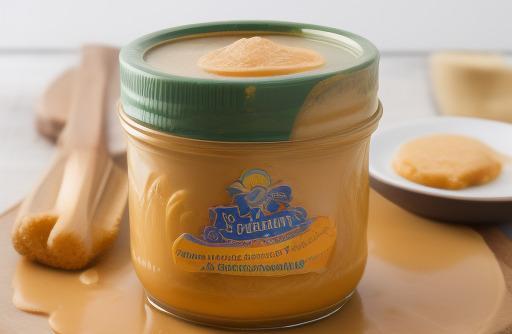- You are here:
- Home »
- Food Substitutes
- » Best Substitutes For Peanut Butter
Best Substitutes For Peanut Butter

Peanut butter is a beloved staple in many households, used in a variety of dishes from sandwiches to desserts. However, there are instances when you may need to find a substitute for peanut butter. Whether it’s due to allergies, dietary restrictions, or simply running out of peanut butter, having alternative options can come in handy. In this article, we will explore the best substitutes for peanut butter and how to use them in various recipes.
Key Takeaways
- Peanut butter is a versatile ingredient that adds a rich, creamy flavor to a wide range of dishes.
- Some common reasons for needing a substitute for peanut butter include allergies, dietary restrictions, or running out of peanut butter.
- When choosing a substitute, consider taste, texture, and nutritional profile to ensure the best match for your needs.
- There are many alternatives to peanut butter, including almond butter, sunflower seed butter, and soy nut butter.
- Substitute amounts may vary depending on the recipe, so it’s important to make adjustments accordingly.
- Experimenting with different substitutes can lead to new and exciting flavor combinations.
Why You Need A Substitute For Peanut Butter
There are several reasons why you might find yourself in need of a substitute for peanut butter. The most common reason is having a peanut allergy or sensitivity. Peanut allergies are relatively common and can range from mild to severe, making it important to avoid peanuts and peanut products altogether. In such cases, finding a substitute that mimics the taste and texture of peanut butter becomes crucial.
Another reason for needing a substitute is due to dietary restrictions. Some people may follow a specific diet, such as a paleo or keto diet, which excludes peanuts or any form of legumes. Additionally, those with a history of gastrointestinal issues might need to avoid peanuts and opt for an alternative that is easier to digest.
Lastly, running out of peanut butter can happen to the best of us. It’s always helpful to have a backup plan and a few alternatives on hand. This is especially true if you frequently use peanut butter in your cooking or baking.
Types Of Substitutes For Peanut Butter

When it comes to finding a substitute for peanut butter, there are various options to choose from. Here are some of the most popular alternatives:
-
Almond Butter: Just like peanut butter, almond butter is made by grinding roasted almonds into a creamy spread. It has a similar nutty flavor and can be used in a 1:1 ratio as a substitute for peanut butter in most recipes.
-
Cashew Butter: Cashew butter is made from roasted cashews and offers a creamy texture and mild flavor. It works well as a substitution for peanut butter in recipes that call for a milder taste.
-
Sunflower Seed Butter: Sunflower seed butter is made from ground sunflower seeds and provides a nut-free alternative to peanut butter. It has a slightly different flavor but can still be used as a 1:1 replacement in many recipes.
-
Soy Nut Butter: Made from roasted soybeans, soy nut butter has a similar texture to peanut butter and can be used in the same amounts. It is a suitable option for those looking for a nut-free alternative.
-
Pumpkin Seed Butter: This unique alternative is made from roasted, ground pumpkin seeds. It has a rich flavor and can be used in both sweet and savory dishes as a substitute for peanut butter.
-
Sesame Seed Butter: Also known as tahini, sesame seed butter is made from ground sesame seeds. While it has a distinct flavor, it can add a delicious nutty taste to recipes and works well as a peanut butter substitute in certain dishes.
-
Coconut Butter: Coconut butter is made from pureed coconut flesh and offers a creamy and slightly sweet taste. It can be used in recipes that benefit from a tropical flavor and can be a good substitute for peanut butter in some cases.
-
Walnut Butter: While not as commonly used as some of the other alternatives, walnut butter can be a delicious substitute for peanut butter. It has a rich, slightly bitter flavor that pairs well with both sweet and savory dishes.
Best Substitutes For Peanut Butter

Now that we have explored the different types of substitutes, let’s dive into the best options available:
1. Almond Butter
Almond butter is a popular and widely available substitute for peanut butter. It shares a similar creamy texture and nutty flavor, making it an excellent choice for those with peanut allergies or dietary restrictions. Almond butter is packed with healthy fats, protein, and fiber, making it a nutritious alternative. It can be used in a 1:1 ratio as a substitution for peanut butter in most recipes.
2. Cashew Butter
Cashew butter offers a creamy texture and mild flavor that is pleasing to many palates. It is made from roasted cashews and can be used as a 1:1 replacement for peanut butter in recipes that call for a milder taste. Cashew butter is also a great source of healthy fats, vitamins, and minerals.
3. Sunflower Seed Butter
Sunflower seed butter is an excellent choice for those with nut allergies as it is entirely nut-free. It has a slightly different flavor compared to peanut butter but can still be used as a 1:1 replacement in many recipes. Sunflower seed butter is high in protein, fiber, and vitamin E, making it a healthy alternative.
4. Soy Nut Butter
Soy nut butter is made from roasted soybeans and has a similar texture to peanut butter. It can be used in the same amounts as a substitution for peanut butter. Soy nut butter is an excellent option for those looking for a nut-free alternative due to allergies or dietary preferences. It is also rich in protein and can provide a similar nutritional profile as peanut butter.
Choosing The Right Substitute For Peanut Butter
When selecting a substitute for peanut butter, there are a few factors to consider. These include taste, texture, and nutritional profile. The following tips will help you choose the right alternative:
-
Taste: Consider the flavor of the substitute and how it will complement the recipe you are making. Some alternatives, like almond butter and cashew butter, closely resemble the taste of peanut butter, while others, like sunflower seed butter, have a slightly different flavor. Experimenting with different substitutes can lead to exciting flavor combinations.
-
Texture: The texture of the substitute is important, especially if you are using it in baking or cooking. Choose a substitute with a similar consistency to peanut butter to achieve the desired result. For example, almond butter has a smooth and creamy texture similar to peanut butter, making it a suitable substitute in most recipes.
-
Nutritional Profile: Consider the nutritional value of the substitute, especially if you are using it as a frequent replacement for peanut butter. Look for options that provide a good balance of healthy fats, protein, and other essential nutrients. Almond butter and cashew butter, for instance, are both nutrient-dense alternatives.
-
Allergies and Dietary Restrictions: If you or someone you are cooking for has allergies or dietary restrictions, ensure that the substitute is allergen-free and fits within the dietary guidelines. Options like soy nut butter and sunflower seed butter are ideal for those with peanut allergies, while coconut butter may be suitable for those following a paleo diet.
Pro Tip:
When using a substitute for peanut butter in recipes, start by following the recommended substitution ratio. If the flavor or consistency seems off, feel free to adjust the amounts to suit your taste and texture preferences.
Cooking With Substitutes For Peanut Butter
Using substitutes for peanut butter in cooking and baking can open up a world of new flavors and possibilities. Here are some ideas for incorporating these alternatives into your recipes:
-
Smoothies and Shakes: Add a spoonful of almond butter or cashew butter to your favorite smoothie or shake for a creamy and nutty flavor. You can also use sunflower seed butter or soy nut butter for nut-free options.
-
Sandwiches and Wraps: Spread almond butter or sunflower seed butter on bread or tortillas for a delicious sandwich or wrap. Pair them with sliced fruits or vegetables for added flavor and crunch.
-
Baking: Substitute peanut butter with almond butter or cashew butter in baking recipes like cookies, brownies, and cakes. The results will be similarly rich and flavorful.
-
Dips and Sauces: Use almond butter or tahini (sesame seed butter) as a base for making savory dips and sauces. They can add a unique nutty taste to your dishes.
-
Energy Balls and Bars: Replace peanut butter with almond butter or sunflower seed butter when making homemade energy balls or granola bars. These alternatives provide the same binding and flavor elements.
-
Thai and Asian Recipes: Use sesame seed butter (tahini) as a substitute for peanut butter in Thai and Asian-inspired dishes like satay sauces or pad Thai. It will add a distinct nutty taste without the use of peanuts.
-
No-Bake Treats: Create no-bake treats like fudge, truffles, or no-bake cheesecake using nut butter substitutes. They offer a creamy and indulgent texture, just like peanut butter.
Recipes Using Substitutes For Peanut Butter
Here are a few recipes to get you started on incorporating substitutes for peanut butter:
Almond Butter Banana Smoothie:
- 1 ripe banana
- 1 cup almond milk
- 1 tablespoon almond butter
- 1 teaspoon honey or maple syrup (optional)
- Ice cubes
Blend all the ingredients together until smooth. Adjust the sweetness and consistency by adding more almond butter or almond milk, as desired. Enjoy as a refreshing and nutritious smoothie.
Sunflower Seed Butter Energy Balls:
- 1 cup rolled oats
- 1/2 cup sunflower seed butter
- 1/4 cup honey or maple syrup
- 1/4 cup shredded coconut (optional)
- 1/4 cup mini chocolate chips (optional)
Mix all the ingredients together in a bowl until well combined. Roll the mixture into bite-sized balls and place them on a baking sheet lined with parchment paper. Chill in the refrigerator for 1 hour before serving. These energy balls are a perfect snack for on-the-go.
Cashew Butter Chocolate Chip Cookies:
- 1 cup cashew butter
- 1/2 cup coconut sugar
- 1 large egg
- 1 teaspoon vanilla extract
- 1/2 teaspoon baking soda
- 1/4 teaspoon salt
- 1/2 cup chocolate chips
Preheat the oven to 350°F (175°C) and line a baking sheet with parchment paper. In a mixing bowl, combine the cashew butter, coconut sugar, egg, vanilla extract, baking soda, and salt. Stir in the chocolate chips. Drop spoonfuls of dough onto the prepared baking sheet and flatten them slightly with a fork. Bake for 8-10 minutes or until golden brown. Allow the cookies to cool before serving.
Storage And Shelf Life Of Substitutes
Most substitutes for peanut butter have a similar shelf life to peanut butter itself. They can typically be stored in a cool, dry place like a pantry for several months. However, it’s always a good idea to check the packaging for specific storage instructions. Nut butters tend to separate over time, so make sure to stir them well before using.
If you prefer to refrigerate your substitutes, keep in mind that they may become thicker and harder to spread when chilled. Leave them at room temperature for a while to soften before use. Additionally, nut butters may develop a slight rancid taste over time, so it’s best to use them within their recommended shelf life.
To extend the shelf life of nut butters, you can also store them in the refrigerator. This can help prevent the oils in the nuts from going rancid and prolong their freshness. However, it’s important to note that refrigeration may cause the butter to solidify, making it less spreadable.
Conclusion

Finding a substitute for peanut butter doesn’t mean compromising on taste or nutrition. From almond butter to sunflower seed butter, there are numerous alternatives to cater to different palates, allergies, and dietary preferences. When choosing a substitute, consider taste, texture, and nutritional value to ensure the best match for your needs. Experiment with different options to discover new flavors and enjoy the versatility of these peanut butter substitutes. Remember to adjust the amounts as needed and explore the vast array of delicious recipes that can be created with these alternatives to peanut butter.
FAQS
What Are The Best Substitutes For Peanut Butter For People With Allergies?
For people who are allergic to peanuts, some of the best substitutes for peanut butter include almond butter, sunflower seed butter, soy nut butter, and cashew butter. These spreads are made from different nuts and seeds and offer a similar creamy texture and nutty flavor like peanut butter. However, it is important to read labels carefully and make sure that the substitute does not contain any traces of peanuts or other allergens.
What Are The Best Substitutes For Peanut Butter For People Looking To Reduce Their Calorie Intake?
For people looking to reduce their calorie intake, some of the best substitutes for peanut butter include powdered peanut butter, powdered almond butter, and powdered sunflower seed butter. These products are made by removing most of the oil and fat from nuts and seeds and then grinding them into powder form. The resulting spread is lower in calories and fat than traditional nut butters, but still offers a similar flavor and texture.
What Are The Best Substitutes For Peanut Butter For People Following A Keto Diet?
For people following a keto diet, some of the best substitutes for peanut butter include almond butter, macadamia nut butter, coconut butter, and pecan butter. These spreads are made from high-fat nuts and seeds and contain very few net carbs, making them ideal for people following a keto diet. Just be sure to choose products that do not contain added sugars or fillers.
What Are The Best Substitutes For Peanut Butter For People Who Are Vegan?
For people who are vegan, some of the best substitutes for peanut butter include almond butter, cashew butter, sunflower seed butter, and tahini. These spreads are made from non-animal sources and offer a similar nutty flavor and creamy texture like peanut butter. Just be sure to choose products that do not contain any animal-derived ingredients like honey or dairy.
What Are The Best Substitutes For Peanut Butter For People Who Are Looking For New Flavors?
For people who are looking for new flavors, some of the best substitutes for peanut butter include flavored nut butters like chocolate almond butter, vanilla cashew butter, and cinnamon pecan butter. These spreads offer unique flavor combinations that can add variety to sandwiches, smoothies, and snacks. Another option is to try making homemade nut butters with different nuts, seeds, and spices to create your own unique blend.
Sources
About the Author Jenny
I'm Jenny, a housewife with an unwavering passion for food. My culinary journey began with my grandmother's kitchen, and it's now a full-fledged food blog. I've turned my love for cooking into a creative outlet, sharing recipes and stories with a global community of fellow food enthusiasts. It's proof that being a housewife can also mean pursuing your passions and savoring life's delectable moments.
